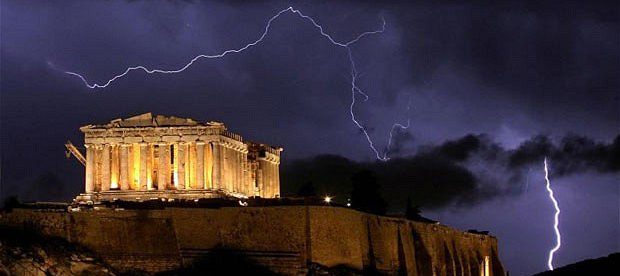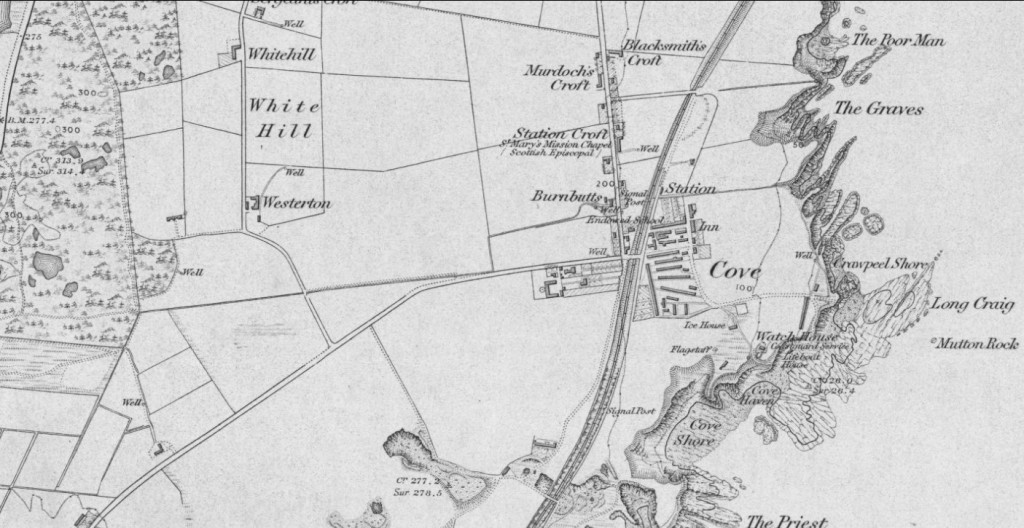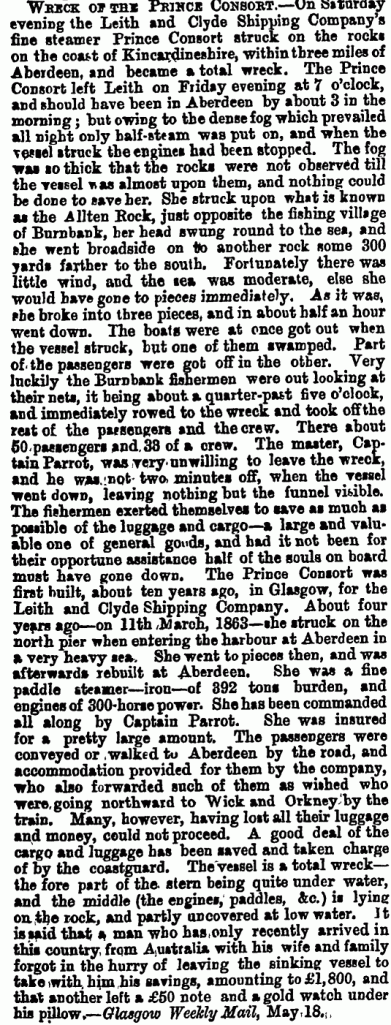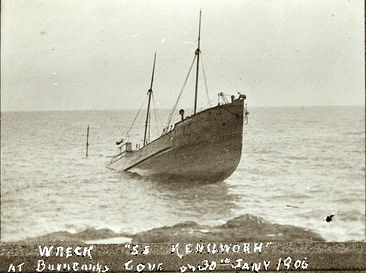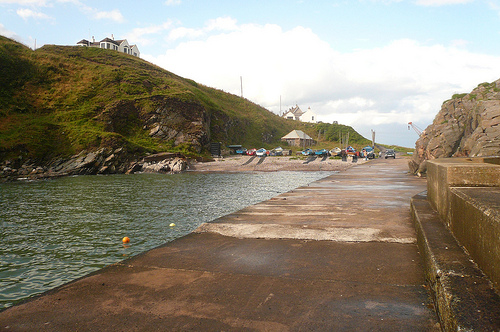Cove Bay

Today Cove is home to around 8,000 people. It is a popular Residential location owing to its Village-like Status. It is a quiet Suburb at the Southern edge of Aberdeen City & in 2015 won the Silver Award for Scotland in Bloom. Altens & Tullos Industrial Estates offer nearby Employment opportunities.
On 15th April 1894 the Cargo Steamer Countess of Aberdeen was Wrecked near Cove Bay, Kincardineshire. She ran aground in Cove Bay. Wreck is about 50M from Shore in 12Ms, rising 6Ms. Keel & Iron plates present.
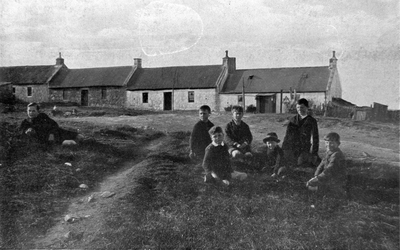
Burnbanks, a Village, in the Parish of Nigg, County of Kincardine; containing 60-Inhabitants. This is a small Village, lying contiguous to 2-others, on the Eastern Coast. It was occupied by Fishermen, who had 2-Boats engaged in the White-Fishery & 3-Boats which proceed yearly to the Herring-Fishery on the North Coast.
Steamer – Prince Consort: 11th March 1863 – They were Shipped by the Steamer “Prince Consort” in the month of March 1863. The Steamers from Leith to Thurso usually call at Aberdeen & Wick on their way Northward. On entering the Harbour of Aberdeen, the “Prince Consort” struck the Pier Platform & ran aground. In 1863, Robert Dick, a Baker of Thurso, was on the brink of Ruin because of recession & competition from other Bakeries in the Town. To add to his difficulties he had ordered 23-Bags of Flour from his Merchants in Leith which were Shipped in the Steamer “Prince Consort” in March 1863.
On entering the Harbour in Aberdeen the Vessel struck the Pier; it was said that the Helmsman was drunk. The Ship eventually broke in Half & Dick’s flour, as yet unpaid for, was soaked by Sea Water. He owed his Merchant £45-13s-6d & was unable to pay the Bill; he could not use the spoiled flour nor could he afford to replace it. The Ship was Wrecked on Aberdeen’s North Pier on 11th March 1863 which resulted in the Vessel breaking in 2. The ‘Prince Consort‘ was an Iron Paddle Steamer of 392 Tonnes burden. First built in Glasgow the Wreck was Salvaged & re-Built in Aberdeen but was destined for further mishap 4-yrs later. In May 1867 it Collided with the Alten Rock within 3-miles short of Aberdeen in Dense Fog off the Coast of Kincardine near Burnbanks a tiny Fishing Village in Nigg Parish & Sank with no Loss of Life as the Local Fishermen (with only 3-Boats) Rescued the Passengers, Crew & Captain.
On 30th January 1906 the Gasworks Collier SS Kenilworth, bound for Aberdeen, hit Rocks near Cove. The Skipper tried to make it to Aberdeen but the Ship took Water too Fast. He & his 9-man Crew abandoned the Kenilworth near Burnbanks & rowed a small Boat as far as Nigg Bay. The Crew’s apparent disappearance caused some anxiety but eventually they turned up in Aberdeen. The Ship & its Cargo were Lost.
The Trebartha was Bombed by Aircraft 4-miles SE of Aberdeen a WW2 Shipping Loss cited as 11th November 1940 but came Ashore off Cove Bay & broke in 2. The Wreck is well broken up & scattered around a Line of Rocks which nearly Cover at High Water Springs. The Engine & Boilers stand about 4.5M high, but present no hazard to Navigation because of the nearby Rocks. There is also a 4-bladed Cast Ion Propeller nearby.
Cove Bay is situated to the East of the Ancient Causey Mounth, which Road was built on High Ground to make passable this only available Medieval Route from Coastal Points South from Stonehaven to Aberdeen. This Ancient Trackway specifically connected the River Dee crossing (where the Bridge of Dee is located) via Portlethen Moss, Muchalls Castle & Stonehaven to the South. The Route was that taken by William Keith, 7th Earl Marischal & the Marquess of Montrose, who led a Covenanter Army of 9000 men in the Battle of the Civil War in 1639. Historically in the extreme North-east corner of Kincardineshire, until 1975 it was Governed from the County Town of Stonehaven, when it was added to the City of Aberdeen. Though simply referred to as Cove, in the 19th & early-20thCs it was known as The Cove, becoming Cove Bay around 1912. Cove Bay Railway Station opened in 1850 and Operated until 1956 for Passengers and 1964 for Goods. The Line remains in use and is now part of the Dundee–Aberdeen Line.
Industry: Cove has been noted for Industries such as Granite, which was Quarried in several Locations to the South of the Village. Owing to its close-grained texture, Cove Granite was one of the hardest in North-east Scotland & proved highly resistant to Frost, making it ideal for Causeway Stones used in the Construction of Roads. It was widely exported to Cities in England, including Billingsgate Market in London.
Fishing: The Village itself sprung up around the Fishing Industry, with the Boats berthed on a Shingle Beach, a Gap in the Rocks that afforded a Natural Harbour. During this time, it is Estimated that approximately 300 people lived in the area. In the mid 19thC the Fishing was at its height, which, over years, has included Cod, Haddock, Salmon, Herring & Shellfish. The Piers & Breakwater were constructed in 1878. At the end of WW1 the Fishing began to Decline. At present only a couple of Boats pursue Shellfish on a part-time basis. Between 1894 & 1937, Cove also housed a Fishmeal Factory, the Aberdeen Fish Meal Factory, which was located at the edge of the Cliffs. It produced quality Manure which was exported to both Europe & America. It became locally known as “The Stinker” because of the Processing Odour, which was highlighted by the Aberdeen Entertainer Harry Gordon in a Parody entitled ‘A Song of Cove‘.
Though much of the past no longer survives, some Architectural Interest may be found on Loirston Road, such as the compact St Mary’s Episcopal Church & the Coastguard Cottages with their Gothic-style Windows, dating from 1821. Then there is the Coastline, where, on the Path heading South, the Cliffs can be seen in all their rugged Glory & the Old Village tumbling towards the Sea. Of course, a visit to the picturesque Harbour, too, will capture the Sea, in all her majestic moods.

The Cove Bay Hotel is located on Colsea Road. There is also The Aberdeen Altens Hotel in Altens, which has 216 Bedrooms, making it the largest of the 3-Thistle Hotels in Aberdeen.
There is also a Pub, the Langdykes which Hosts all live Sport and promotes live Music every Saturday Evening.
Ballooning. Aberdeen Journal” of 15th August 1827: On Monday Evening our ingenious Townsman, Mr Ramage, Set Off, from the Court of Marischal College, a Balloon of most Magnificent Dimensions, the Height being above 50-ft & the Dia 30-ft. The process of Inflation commenced about 6-pm & at a 6.45-pm the Balloon Slowly & Majestically Ascended, amid the Loud Plaudits of the Spectators, not the slightest Accident occurring to retard its Progress. The Wind was from the NNW & the Balloon, after Rising to the Altitude of about 3,000-ft & Travelled for a Distance of nearly 4–miles, tit then Fell into the Sea about 1½-mile off the Cove. It was brought Ashore by the Men of the Preventive Coast Guard, but. we are sorry to add, was immediately Laid Hold of by some of the Fisher People, who either from the Dread of the Monster, or a Desire to Possess the Materials of which it was Composed, set about cutting it to Pieces & appropriating the Ffragments to their Own Uses.
